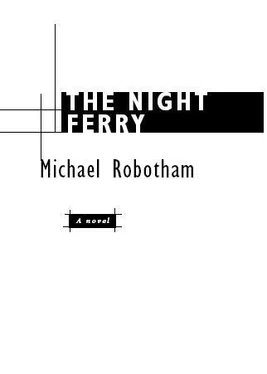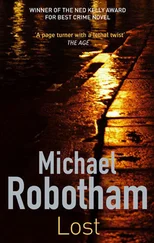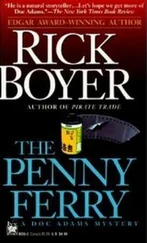“Someone inside the truck had a mobile,” he explains. “When they began to suffocate they tried to call someone and reached an emergency number. The operator thought it was a hoax because the caller couldn’t give a location.”
I look toward the massive roll-on, roll-off ferry with its open stern doors.
“Why am I here?”
He flicks his wrist and the sheet curls back. A teenage boy with fleshy limbs and dark hair lies on the slab. His head is almost perfectly round and pink except for the blueness around his lips and the overlapping folds of flesh beneath his chin.
Forbes hasn’t moved. He’s watching me from behind his rectangular glasses.
I drag my eyes away. With a birdlike quickness he grips my arm. “This is all he was wearing—a pair of trousers and a shirt. No labels. Normally, clothes like this tell us nothing. They’re cheap and mass produced.” His fingers are digging into me. “These clothes are different. There was something sewn into the lining. A name and address. Do you know whose name? Whose address?”
I shake my head.
“Yours.”
I try not to react but that in itself is a reaction.
“Can you explain that?” he asks.
“No.”
“Not even a vague notion.”
My mind is racing through the possibilities. My mother used to put labels on my clothes because she didn’t want me losing things. My name, not my address.
“You see how it looks,” he says, clicking his tongue again. “You have been implicated in a people-trafficking investigation and potentially a murder investigation. We think his name is Hassan Khan. Does that mean anything to you?”
“No.”
“The lorry is Dutch registered. The driver is listed on the passenger manifest as Arjan Molenaar.”
Again I shake my head.
Numbness rather than shock seeps through me. It feels like someone has walked up and hit me in the back of the head with a metal tray and the noise is still ringing in my ears.
“Why weren’t they found sooner?”
“Do you know how many lorries pass through Harwich every day? More than ten thousand. If Customs searched every one of them there’d be ships queued back to Rotterdam.”
Noonan joins us, leaning over the body and talking as though the teenager were a patient and not a corpse.
“All right young fellow, please try to be candid. If you open up to the process in good faith we’ll find out more about you. Now let’s take a look.”
He peers closer, almost putting his lips on the boy’s cheek. “There is evidence of petechial hemorrhages, pinpoint, less than one millimeter on the eyelids, lips, ears, face and neck, consistent with lack of oxygen to the tissue…”
He holds up an arm, examining the skin.
“The scarring indicates an old thermal injury to the left forearm and hand. Something very intense, perhaps a blast.”
I notice dozens of smaller scars on his chest. Noonan takes an interest, using a ruler to measure them.
“Very unusual.”
“What are they?”
“Knife wounds.”
“He was stabbed?”
“Someone sliced him up.” He flicks an imaginary knife through the air. “None of the wounds is particularly deep. The blade threatened no organs or major blood vessels. Excellent control.”
The pathologist sounds impressed—like one surgeon admiring the work of another.
He sees something else. Lifting the boy’s right arm, he turns it outward, displaying the wrist. A small tattooed butterfly hovers halfway between the palm and elbow. Noonan takes a measurement and speaks into a digital recorder.
Forbes has shown me enough.
“I wish to go home now,” I say.
“I still have questions.”
“Do I need a lawyer?”
The question disappoints him. “I can provide you with someone if you wish.”
I know I should be more concerned but the desire for knowledge overrides my natural caution. It’s not about being invincible or believing my innocence will protect me. I’ve seen too many miscarriages of justice to be so optimistic.
The terminal has a café for freight drivers. Forbes takes a table and orders coffee and a bottle of water.
For the next hour he dissects my personal life, my friends and associates. Over and over I make the same point. I have no idea how my name and address were sewn into the clothes of Hassan Khan.
“Is it my color?” I ask him eventually.
His countenance falls. “Why do people always do that? Play the race card. Whenever someone from a minority background is questioned I can guarantee it’s coming. This has nothing to do with your color or your religion or where you were born. Your name and address were sewn into a dead kid’s clothes. An illegal. That’s what makes you a person of interest.”
I wish I could take the question back.
He takes out a half packet of cigarettes and counts them, rationing himself. “Have you any idea how big it is—people trafficking?” He puts the packet away, clicking his tongue as though admonishing himself.
“More than 400,000 people were trafficked into Western Europe last year. The Italian Mafia, the Russians, the Albanians, the Japanese Yakuza, the Chinese Snakeheads—they’re all involved. And beneath the big syndicates are thousands of smaller freelance gangs that operate with nothing more than a couple of mobile phones, a speed boat and a transit van. They corrupt border guards, politicians, police and customs officers. They are bottom-feeding scum who prey on human misery. I hate them. I really do.”
His eyes are locked on mine. His tongue is making that sound again. I suddenly realize what he reminds me of: the roadrunner. Wile E. Coyote was always trying to catch that arrogant, beeping bird, coming up with ridiculous booby traps and snares. Just once I wanted the coyote to win. I wanted the hundred-pound barbell or the bundle of dynamite or the slingshot to work, so he could ring that scrawny bird’s neck.
As if on cue there is a beep beep from Forbes’s pager. He makes a phone call on the far side of the cafeteria. Something must have been said during the call because his demeanor changes.
“I’m sorry for keeping you so long, DC Barba.”
“So I can leave?”
“Yes, of course, but it’s very late. Accommodation has been arranged in town. The pub looks quite nice. I can have you driven back to London in the morning.”
He tugs nervously at the cuffs of his jacket, as though worried the sleeves might be shrinking. I wonder who called. Sikh girls don’t have friends in high places.
The pub is quaint and rustic, although I’ve never been exactly sure what “rustic” means. The restaurant annex has low ceilings with fishing nets strung from the beams and a harpoon bolted above the bar.
Forbes invites me to dinner. “I’m a detective inspector but you don’t have to consider it an order,” he says, trying to be charming.
I can smell the kitchen. My stomach rumbles. Perhaps I can find out more about Hassan Khan.
Shrugging off his gray jacket, Forbes stretches his legs beneath the table and makes a fuss over ordering and tasting the wine.
“This is very good,” he comments, holding his glass up to the light. “Are you sure you won’t have some?” Without waiting for me to answer he pours himself another glass.
I have been calling him Mr. Forbes or sir. He says I should call him Robert. I don’t give him permission but he calls me Alisha anyway. He asks if I’m married.
“You know that already.”
“Yes, of course.”
He has pale Nordic eyes and his bottom teeth are crooked but he has a pleasant smile and an easy laugh. The clicking sound seems to go away when he relaxes. Perhaps it’s a nervous thing, like a stutter.
“So what about your family?” he asks. “When did they come to Britain?”
Читать дальше












